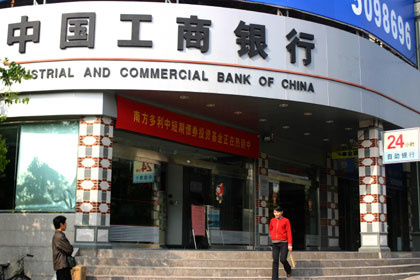The Industrial and Commercial Bank of China (ICBC) Chairman Jiang Jianqing
confirmed in Beijing Monday the biggest state bank of China would sell shares to
the public in 2006, following on the heels of the China Construction Bank and
Bank of China in a market listing rush.
"We will materialize an initial public offering (IPO) and market listing this
year," Jiang told a signing ceremony on building financial ties between the bank
and a major domestic steel plant, but declined to confirm whether his bank would
be listed in the domestic market, which recently soared on improved market
sentiment.

A customer walks out of an ICBC office in
Xiamen, east China's Fujian Province in this April 25, 2006 photo. ICBC
confirmed that it will go public this year.
[newsphoto] |
Jiang said he expects the ICBC,
by market value, to be among the world top 10 banks, with 2006 business profits
exceeding 100 billion yuan.
Chinese banks have piled up a mountain of problem debts over the past decades
due to reckless -- usually government-ordered -- lending to state-owned
enterprises, sapping their competitiveness, analysts acknowledge.
However, they have been shedding off hefty bad debts, pushing forward
joint-stock reform, inviting foreign investors, trying to secure stock market
listings and taking other measures to help streamline operations in advance of
the full opening of China's financial markets to foreign rivals -- under a
commitment to the World Trade Organization in 2001 -- by the end of this year.
The Bank of China has kicked off an IPO in Hong Kong slated to be the world's
biggest in six years by raising an estimated 68.07 billion Hong Kong dollars,
triggering a buying spree on the BOC's state bank status and upgraded operation.
Another factor feeding the frenzy for the BOC is the remarkable success two
other big Chinese lenders that had IPOs in Hong Kong last year.
The share price for the Construction Bank, the nation's No. 4 lender, has
shot up 50 percent since its IPO in late October, while the share price of the
Bank of Communications, the fifth largest, has nearly doubled since it hit the
market in June.
Banks had fears that the longtime bearish domestic market, allegedly plagued
by market manipulation and other abuses, might not be an ideal choice for them,
but China's share prices have been surging in recent months on the back of
policy support and fresh fund inflows.
The ICBC became a joint-stock company in October, assuming all business and
relevant assets and debts of the former solely state-owned bank, with the
Ministry of Finance and Central Huijin Investment Co. Ltd., a central government
investment arm, each holding a 50 percent stake.
Months later, a foreign trio of Goldman Sachs, American Express and Allianz
Group paid a combined 3.78 billion U.S. dollars for a 8.89 percent stake in the
ICBC, the biggest-ever amount of foreign investment in China's banking industry.
The ICBC now boasts 18,000 business outlets in China's mainland, serving more
than 4 million enterprises and more than 100 million individual clients.
Its capital adequacy ratio (CAR), the measure of its available capital in
proportion to its outstanding loans, rose to 10.26 percent by the end of last
year, already above the 8 percent requirement by the international standard.
The bank's non-performing loan ratio fell to 4.43 percent by 2005, coming
closer to the 1-2 percent level reported by sophisticated foreign banks.